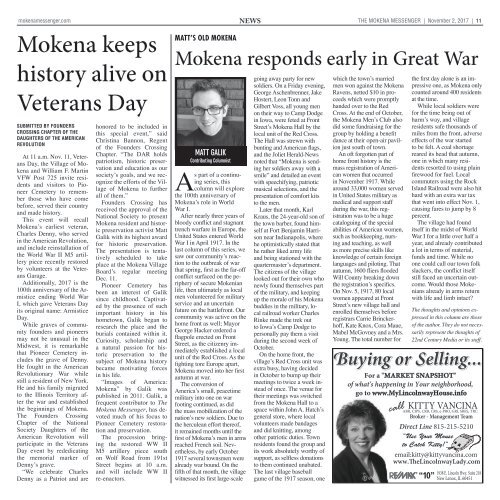MM_110217
The Mokena Messenger 110217
The Mokena Messenger 110217
Create successful ePaper yourself
Turn your PDF publications into a flip-book with our unique Google optimized e-Paper software.
mokenamessenger.com news<br />
the Mokena Messenger | November 2, 2017 | 11<br />
Mokena keeps<br />
history alive on<br />
Veterans Day<br />
Submitted by Founders<br />
Crossing Chapter of the<br />
Daughters of the American<br />
Revolution<br />
At 11 a.m. Nov. 11, Veterans<br />
Day, the Village of Mokena<br />
and William F. Martin<br />
VFW Post 725 invite residents<br />
and visitors to Pioneer<br />
Cemetery to remember<br />
those who have come<br />
before, served their country<br />
and made history.<br />
This event will recall<br />
Mokena’s earliest veteran,<br />
Charles Denny, who served<br />
in the American Revolution,<br />
and include reinstallation of<br />
the World War II M5 artillery<br />
piece recently restored<br />
by volunteers at the Veterans<br />
Garage.<br />
Additionally, 2017 is the<br />
100th anniversary of the Armistice<br />
ending World War<br />
I, which gave Veterans Day<br />
its original name: Armistice<br />
Day.<br />
While graves of community<br />
founders and pioneers<br />
may not be unusual in the<br />
Midwest, it is remarkable<br />
that Pioneer Cemetery includes<br />
the grave of Denny.<br />
He fought in the American<br />
Revolutionary War while<br />
still a resident of New York.<br />
He and his family migrated<br />
to the Illinois Territory after<br />
the war and established<br />
the beginnings of Mokena.<br />
The Founders Crossing<br />
Chapter of the National<br />
Society Daughters of the<br />
American Revolution will<br />
participate in the Veterans<br />
Day event by rededicating<br />
the memorial marker of<br />
Denny’s grave.<br />
“We celebrate Charles<br />
Denny as a Patriot and are<br />
honored to be included in<br />
this special event,” said<br />
Christina Bannon, Regent<br />
of the Founders Crossing<br />
Chapter. “The DAR holds<br />
patriotism, historic preservation<br />
and education as our<br />
society’s goals, and we recognize<br />
the efforts of the Village<br />
of Mokena to further<br />
all of them.”<br />
Founders Crossing has<br />
received the approval of the<br />
National Society to present<br />
Mokena resident and historic<br />
preservation activist Matt<br />
Galik with its highest award<br />
for historic preservation.<br />
The presentation is tentatively<br />
scheduled to take<br />
place at the Mokena Village<br />
Board’s regular meeting<br />
Dec. 11.<br />
Pioneer Cemetery has<br />
been an interest of Galik<br />
since childhood. Captivated<br />
by the presence of such<br />
important history in his<br />
hometown, Galik began to<br />
research the place and the<br />
burials contained within it.<br />
Curiosity, scholarship and<br />
a natural passion for historic<br />
preservation to the<br />
subject of Mokena history<br />
became motivating forces<br />
in his life.<br />
“Images of America:<br />
Mokena” by Galik was<br />
published in 2011. Galik, a<br />
frequent contributor to The<br />
Mokena Messenger, has devoted<br />
much of his focus to<br />
Pioneer Cemetery restoration<br />
and preservation.<br />
The procession bringing<br />
the restored WW II<br />
M5 artillery piece south<br />
on Wolf Road from 191st<br />
Street begins at 10 a.m.<br />
and will include WW II<br />
re-enactors.<br />
Matt’s Old Mokena<br />
Mokena responds early in Great War<br />
Matt Galik<br />
Contributing Columnist<br />
As part of a continuing<br />
series, this<br />
column will explore<br />
the 100th anniversary of<br />
Mokena’s role in World<br />
War I.<br />
After nearly three years of<br />
bloody conflict and stagnant<br />
trench warfare in Europe, the<br />
United States entered World<br />
War I in April 1917. In the<br />
last column of this series, we<br />
saw our community’s reaction<br />
to the outbreak of war<br />
that spring, first as the far-off<br />
conflict surfaced on the periphery<br />
of secure Mokenian<br />
life, then ultimately as local<br />
men volunteered for military<br />
service and an uncertain<br />
future on the battlefront. Our<br />
community was active on the<br />
home front as well; Mayor<br />
George Hacker ordered a<br />
flagpole erected on Front<br />
Street, as the citizenry immediately<br />
established a local<br />
unit of the Red Cross. As the<br />
fighting tore Europe apart,<br />
Mokena moved into her first<br />
autumn at war.<br />
The conversion of<br />
America’s small, peacetime<br />
military into one on war<br />
footing continued, as did<br />
the mass mobilization of the<br />
nation’s new soldiers. Due to<br />
the herculean effort thereof,<br />
it remained months until the<br />
first of Mokena’s men in arms<br />
reached French soil. Nevertheless,<br />
by early October<br />
1917 several townsmen were<br />
already war bound. On the<br />
fifth of that month, the village<br />
witnessed its first large-scale<br />
going away party for new<br />
soldiers. On a Friday evening,<br />
George Aschenbrenner, Jake<br />
Hostert, Leon Tonn and<br />
Gilbert Voss, all young men<br />
on their way to Camp Dodge<br />
in Iowa, were feted at Front<br />
Street’s Mokena Hall by the<br />
local unit of the Red Cross.<br />
The Hall was strewn with<br />
bunting and American flags,<br />
and the Joliet Herald-News<br />
noted that “Mokena is sending<br />
her soldiers away with a<br />
smile” and detailed an event<br />
with speechifying, patriotic<br />
musical selections, and the<br />
presentation of comfort kits<br />
to the men.<br />
Later that month, Karl<br />
Kraus, the 24-year-old son of<br />
the town barber, found himself<br />
at Fort Benjamin Harrison<br />
near Indianapolis, where<br />
he optimistically stated that<br />
he rather liked army life<br />
and being stationed with the<br />
quartermaster’s department.<br />
The citizens of the village<br />
looked out for their own who<br />
newly found themselves part<br />
of the military, and keeping<br />
up the morale of his Mokena<br />
buddies in the military, local<br />
railroad worker Charles<br />
Rinke made the trek out<br />
to Iowa’s Camp Dodge to<br />
personally pay them a visit<br />
during the second week of<br />
October.<br />
On the home front, the<br />
village’s Red Cross unit was<br />
extra busy, having decided<br />
in October to bump up their<br />
meetings to twice a week instead<br />
of once. The venue for<br />
their meetings was switched<br />
from the Mokena Hall to a<br />
space within John A. Hatch’s<br />
general store, where local<br />
volunteers made bandages<br />
and did knitting, among<br />
other patriotic duties. Town<br />
residents found the group and<br />
its work absolutely worthy of<br />
support, as selfless donations<br />
to them continued unabated.<br />
The last village baseball<br />
game of the 1917 season, one<br />
which the town’s married<br />
men won against the Mokena<br />
Ravens, netted $10 in proceeds<br />
which were promptly<br />
handed over to the Red<br />
Cross. At the end of October,<br />
the Mokena Men’s Club also<br />
did some fundraising for the<br />
group by holding a benefit<br />
dance at their open-air pavilion<br />
just south of town.<br />
An oft forgotten part of<br />
home front history is the<br />
mass registration of American<br />
women that occurred<br />
in November 1917. While<br />
around 33,000 women served<br />
in United States military as<br />
medical and support staff<br />
during the war, this registration<br />
was to be a huge<br />
cataloguing of the special<br />
abilities of American women,<br />
such as bookkeeping, nursing<br />
and teaching, as well<br />
as more precise skills like<br />
knowledge of certain foreign<br />
languages and piloting. That<br />
autumn, 1600 fliers flooded<br />
Will County breaking down<br />
the registration’s specifics.<br />
On Nov. 5, 1917, 80 local<br />
women appeared at Front<br />
Street’s new village hall and<br />
enrolled themselves before<br />
registrars Carrie Brinckerhoff,<br />
Kate Knox, Cora Maue,<br />
Mabel McGovney and a Mrs.<br />
Young. The total number for<br />
the first day alone is an impressive<br />
one, as Mokena only<br />
counted around 400 residents<br />
at the time.<br />
While local soldiers were<br />
for the time being out of<br />
harm’s way, and village<br />
residents safe thousands of<br />
miles from the front, adverse<br />
effects of the war started<br />
to be felt. A coal shortage<br />
reared its head that autumn,<br />
one in which many residents<br />
resorted to using plain<br />
firewood for fuel. Local<br />
commuters using the Rock<br />
Island Railroad were also hit<br />
hard with an extra war tax<br />
that went into effect Nov. 1,<br />
causing fares to jump by 8<br />
percent.<br />
The village had found<br />
itself in the midst of World<br />
War I for a little over half a<br />
year, and already contributed<br />
a lot in terms of material,<br />
funds and time. While no<br />
one could call our town folk<br />
slackers, the conflict itself<br />
still faced an uncertain outcome.<br />
Would those Mokenians<br />
already in arms return<br />
with life and limb intact?<br />
The thoughts and opinions expressed<br />
in this column are those<br />
of the author. They do not necessarily<br />
represent the thoughts of<br />
22nd Century Media or its staff.<br />
Broker - Management Team<br />
“10”


















